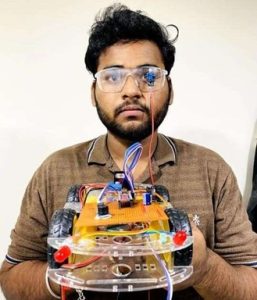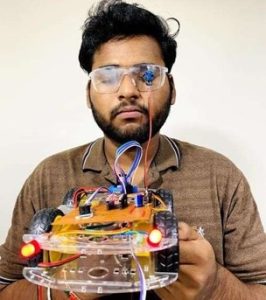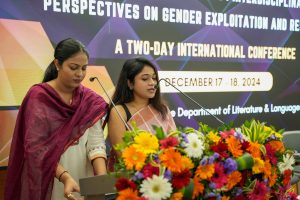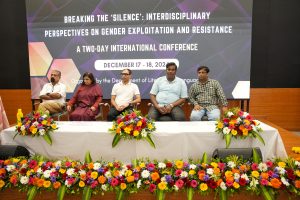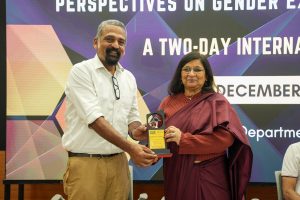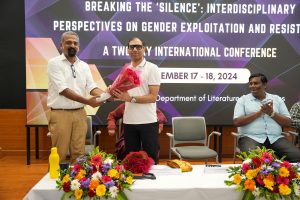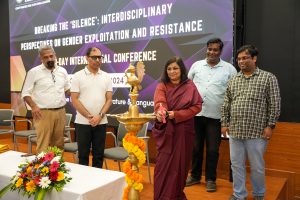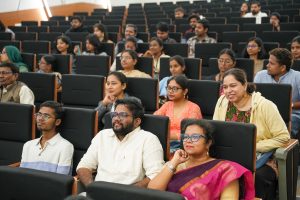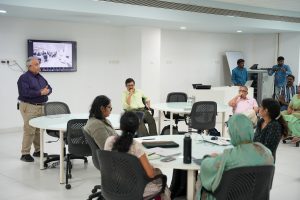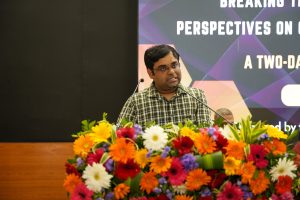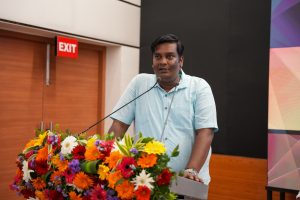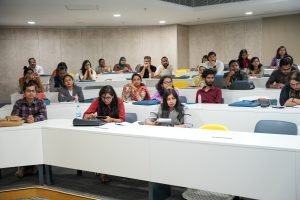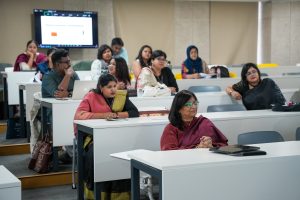TLC Facilitates Workshop for PhD Scholars
 The Teaching Learning Centre conducted a one-day workshop on innovative teaching methods, designed exclusively for PhD Scholars. The event saw the participation of 40 scholars from various departments who sought to enhance their teaching and research capabilities through advanced pedagogical techniques.
The Teaching Learning Centre conducted a one-day workshop on innovative teaching methods, designed exclusively for PhD Scholars. The event saw the participation of 40 scholars from various departments who sought to enhance their teaching and research capabilities through advanced pedagogical techniques.
The workshop was led by Prof. James M Conrad, a renowned academic and expert in embedded systems, robotics, and modern teaching methodologies. With his extensive academic experience and leadership roles, including contributions to IEEE, Prof. Conrad brought a global perspective to the session. He guided the participants through strategies to foster student engagement, manage diverse learning needs, and incorporate innovative approaches into classroom and laboratory settings.
The workshop focused on equipping scholars with practical skills to create engaging and inclusive learning environments. Participants explored the use of digital platforms and modern educational technologies to enhance teaching effectiveness and improve student outcomes. Interactive discussions and hands-on activities encouraged scholars to exchange ideas, collaborate, and develop tailored teaching strategies that meet the needs of diverse learners.
By the end of the session, the scholars gained confidence in applying innovative, student-centered methodologies. They felt empowered to contribute significantly to the quality of education and learning outcomes at their respective institutions. This training not only prepared them for their roles as Teaching Assistants (TAs) but also equipped them with the tools to excel as future educators and researchers.
The workshop exemplifies SRM AP’s commitment to fostering excellence in education through innovative training programmes. It highlighted the university’s dedication to preparing scholars for the evolving challenges of academia, ensuring they are equipped to create impactful learning experiences.





- Published in News, Teaching Learning Centre, TLC
Dr Gavaskar Publishes Patent on Generating Prompts
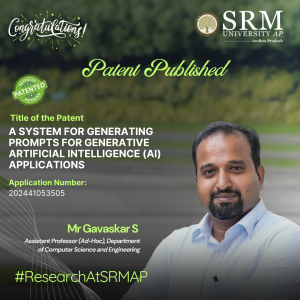
The Department of Computer Science and Engineering is proud to announce that Dr S Gavaskar has published his patent titled A System for Generating Prompts for Generative Artificial Intelligence (AI) Applications (Application Number: 202441091788). This groundbreaking invention will prove to be a significant advancement in the field of AI, enabling the creation of contextually rich and user-specific prompts, thereby enhancing the accuracy and usability of generative AI systems across various domains.
A Brief Abstract:
This research invention relates to Prompt creation process for Generative AI Application by introducing Four way corpus directory(FWCD) comprising the Persona corpus, Localized Application Specific Content Corpus, Annotator corpus, and Stopword corpus to create well-formed, contextual prompts for AI models. It also employs Semantic Based Categorization and Ranking(SBCR) for semantically categorizing and ranking the content present in the Localized Application Specific Content Corpus . The invention improves the interaction between users and Generative AI. It helps deliver more accurate, semantic based outputs from the AI models, improving the overall performance and usability of the system.
Explanation in Layperson’s Terms:
Prompt engineering is the process of using natural language to create instructions that generative artificial intelligence (AI) models can understand and interpret.In this research we have create a system for prompt creation by which the users can create their own prompt with the combination of their persona details,stopword,annotator content from their localized corpus directory before applying to the LLM models such as ChatGPT,Copilot etc.
Practical Implementation / Social Implications:
- This concept can be implemented in Education Institutions to generate tailored prompts for learning materials and academic projects.Enterprises can use localized content to generate role-specific prompts. and marketing organizations can use to create prompts aligned with specific campaigns or audience demographics.It can also be used in organizations where multiple persons with different roles and responsibilities are there and they have their own localized content for which a prompt has to be created for an Generative AI Application.
This invention also lets people from different skill levels access the system and create their own prompt for their applications.
Future Research Plans:
Future research focus is on creating LLM and AI related applications to the field related to education.cyber security,Legal and Enterprises.
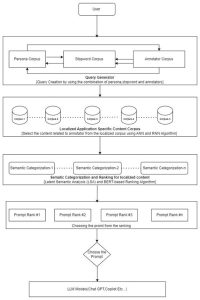
- Published in CSE NEWS, Departmental News, News, Research News
Smart Solutions for Road Safety
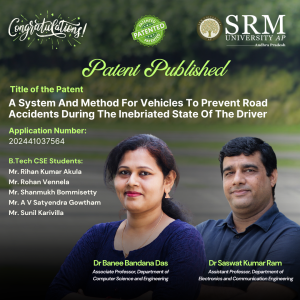 Dr Saswat Kumar Ram and Dr Banee Bandana Das from the Department of Electronics and Communication Engineering have developed an intelligent safety system to prevent road accidents caused by drowsiness and alcohol consumption. Their patented research, A System and Method for Vehicles to Prevent Road Accidents During the Inebriated State of the Driver (Indian Patent No. 202441037564), uses simple sensors and microcontrollers to provide real-time safety feedback, offering an affordable and effective solution for enhancing vehicle safety.
Dr Saswat Kumar Ram and Dr Banee Bandana Das from the Department of Electronics and Communication Engineering have developed an intelligent safety system to prevent road accidents caused by drowsiness and alcohol consumption. Their patented research, A System and Method for Vehicles to Prevent Road Accidents During the Inebriated State of the Driver (Indian Patent No. 202441037564), uses simple sensors and microcontrollers to provide real-time safety feedback, offering an affordable and effective solution for enhancing vehicle safety.
A Brief Abstract:
This research offers the best solution to improve security measures in the control system by integrating simple sleep and odour sensors. The goal is to create an intelligent safety management system. The devices used are microcontroller, motor drivers, motors, MQ-3 (alcohol sensor), IR sensor (drowsiness detection), buzzer, and lights, these are the main components used in this project for hardware. The embedded-C language is used for the Arduino IDE. The system is designed to provide safety feedback in a variety of applications. MQ-3 can be used to detect and identify environmental odours in people, whether drunken. Our aim is to design product that can be inexpensive and easy to integrate into existing control systems, making it suitable for many applications such as automobiles, workplaces, and homes. This research is a good step towards improving the security of the control system by using the ability of simple and inexpensive equipment for instant monitoring and response.
Explanation in Layperson’s Terms:
The proposed safety control system effectively detects drowsiness and alcohol consumption, utilizing simple sensors MQ-3 and IR sensor to enhance road safety. By integrating these sensors with Microcontroller, the system triggers real-time alerts to prevent accidents. Upon detecting alcohol, the car automatically slows down, minimizing speed and activating LED backlights to indicate the driver’s inebriated state. Similarly, when drowsiness is detected, the system reduces car speed, emits a buzzing sound, and activates lights, signaling the driver’s drowsy condition. This comprehensive approach addresses both drowsiness and alcohol consumption, two major contributors to road accidents. The system’s simplicity, affordability, and ease of integration make it a promising solution for enhancing vehicle safety.
Practical Implementation
The current invention addresses the generic problems that cause road accidents and tries to control the speed of the vehicle and play buzzer to ensure the safety of the passengers and driver. To best of authors’ knowledge, th parameter detection i.e. alcohol and drowsiness detection.
The present invention can be used in smart city and smart villages applications for making the road safe, driver and passengers safe, and few application areas are:
- Smart City and Smart Village: This technique and system can reduce road accidents caused due to alcohol consumption and drowsiness.
- Automobile Industry: The system can be easily integrated with the existing control system in vehicles to ensure safety.
Future Research Plans:
To develop more secure and reliable safety mechanism for safe driving.
- Published in Departmental News, ECE NEWS, News, Research News
Unveiling Microplastic Pollution in Landfill-Mined Bio-Earth
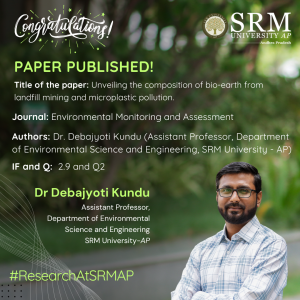 Dr Debajyoti Kundu, from the Department of Environmental Science and Engineering, has conducted pioneering research on the composition of bio-earth recovered from landfill mining at the Bhandewadi landfill in Nagpur, India. His study, Unveiling the Composition of Bio-Earth from Landfill Mining and Microplastic Pollution, reveals the presence of microplastics in bio-earth, raising concerns about its safety for agricultural use. The research underscores the importance of addressing microplastic contamination to ensure the sustainable application of landfill-mined materials in agriculture.
Dr Debajyoti Kundu, from the Department of Environmental Science and Engineering, has conducted pioneering research on the composition of bio-earth recovered from landfill mining at the Bhandewadi landfill in Nagpur, India. His study, Unveiling the Composition of Bio-Earth from Landfill Mining and Microplastic Pollution, reveals the presence of microplastics in bio-earth, raising concerns about its safety for agricultural use. The research underscores the importance of addressing microplastic contamination to ensure the sustainable application of landfill-mined materials in agriculture.
A Brief Abstract:
This study explores the composition of bio-earth derived from landfill mining at the Bhandewadi landfill, Nagpur, India, and investigates the presence of microplastics within it. The bio-earth was characterized by key parameters such as moisture content, organic carbon, nutrient levels, and heavy metal concentrations. Microplastic contamination was also assessed using ATR-FTIR spectroscopy, revealing a significant presence of microplastics in the bio-earth. The findings highlight the need for further research and strategies to mitigate microplastic pollution to ensure the safe use of bio-earth in agricultural applications.
Explanation in layperson’s terms:
In this study, we looked at bio-earth, which is a material recovered from old landfill sites, and examined its quality and the presence of harmful microplastics. Landfill mining is an emerging technique that helps recover valuable resources from old waste. Bio-earth is often used as a natural fertilizer, but the problem is that it can contain tiny plastic particles (microplastics) which can harm the environment. Our research found that the bio-earth from a landfill in Nagpur, India, had both useful nutrients for plants and significant levels of microplastics. This is concerning because it could affect the safety of using such material in farming or gardening. Our work suggests that more research is needed to figure out how to remove these plastics and make the bio-earth safer for agricultural use.
Practical Implementation:
The findings of this research have significant implications for environmental management and waste recycling. The presence of microplastics in bio-earth poses risks to soil health, plant growth, and potentially to human health when used in agriculture. The research highlights the need for proper waste management techniques to reduce microplastic contamination and improve the safety of recycled materials like bio-earth. This study also calls for developing strategies to remove or reduce microplastics from landfill mining processes, ensuring that bio-earth can be used safely as a fertilizer or soil conditioner without further environmental harm.
Collaborations:
This research was conducted through collaboration between several esteemed institutions:
CSIR – National Environmental Engineering Research Institute (CSIR-NEERI), Nagpur, India
Banaras Hindu University (BHU), Varanasi, India
Future Research Plans:
We plan to develop methods for removing microplastics from bio-earth, assess their impact on soil and plant health, and explore sustainable waste processing techniques to reduce plastic contamination. Our goal is to enhance the safety and sustainability of landfill-mined materials in agriculture.
The link to the article:
https://link.springer.com/article/10.1007/s10661-024-13229-2
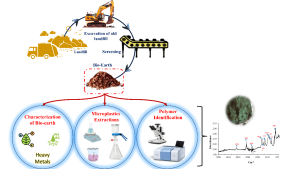
- Published in Departmental News, ENVS News, News, Research News
Dr Kaushik’s Research on Hydrogen Peroxide Mediated Thermo-Catalytic Conversion of Carbon Dioxide
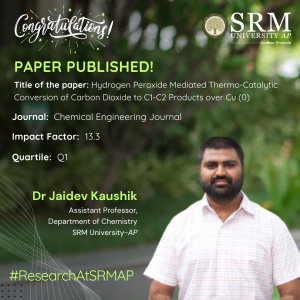 Dr Jaidev Kaushik, Assistant Professor from the Department of Chemistry, has introduced an innovative method for converting CO₂ emissions into valuable products like acetic acid, offering a sustainable solution to combat climate change. His groundbreaking research has been published in the Chemical Engineering Journal under the title, Hydrogen Peroxide Mediated Thermo-Catalytic Conversion of Carbon Dioxide to C1-C2 Products over Cu(0).
Dr Jaidev Kaushik, Assistant Professor from the Department of Chemistry, has introduced an innovative method for converting CO₂ emissions into valuable products like acetic acid, offering a sustainable solution to combat climate change. His groundbreaking research has been published in the Chemical Engineering Journal under the title, Hydrogen Peroxide Mediated Thermo-Catalytic Conversion of Carbon Dioxide to C1-C2 Products over Cu(0).
A Brief Abstract:
The global challenge concerning CO2 conversion to valuable products is anticipated to play a critical role towards net zero carbon emissions. Thermal CO2 reduction is advantageous in terms of higher conversion rates, selectivity, and already-established industrial thermal instruments for scalability. However, the method is energy-intensive, a hindrance to sustainably practical adoption. Herein, we present a comprehensive study of H2O2-mediated thermal CO2 conversion in the presence of dendritic zerovalent copper (d-ZCu) in a batch-type reactor, yielding C1 and C2 carbon products, with acetic acid (AcOH) as the major product (achieving an optimized yield of approximately 0.98 M and a selectivity of around 97% at near-ambient conditions of 25-150°C and 1-15 bar), along with trace amounts of methanol and ethanol, and carbon monoxide (CO) as a gaseous product. The reaction parameters, including temperature, time, pressure, and concentrations, were optimized to gain better insight into the reaction. To further explore the feasibility of the process, experiments were conducted in a continuous flow-packed bed reactor using similar parameters as those in the batch reactor, where CO was identified as the primary product of CO2 reduction. For advanced real-life applicability, the as-emitted exhaust gases from diesel and petrol engines, as sources of anthropogenic CO2, were utilized to establish the practical applicability of the proposed method.
Explanation in Layperson’s Terms:
In our work, we found a way to convert CO2, a gas that contributes to climate change, into useful products. We used hydrogen peroxide and a special type of copper catalyst (zerovalent and dendritic shaped) to change CO2 into things like acetic acid (used in vinegar), methanol, ethanol, and carbon monoxide. The main product we made was acetic acid, and the process worked well at lower temperatures and pressures, which means it used less energy. To see if this could be useful in real life, we tested it with CO2 coming from car exhaust, including diesel and petrol engines, and found that it could help reduce pollution. This shows that our method could be a practical way to reduce CO2 emissions from everyday sources.
Practical Implementation and Social Implications:
The practical implementation of our research offers a promising solution for reducing CO2 emissions by converting this harmful gas into valuable products like acetic acid, methanol, ethanol, and carbon monoxide. We used hydrogen peroxide and a dendritic zerovalent copper to operate our method at lower temperatures and pressures, making it more energy-efficient than traditional CO₂ reduction techniques. The implementation of this approach may not only help industries reduce their carbon footprint but also provide economic value by synthesizing widely used products. A key social benefit is its potential to capture and convert CO2 emissions from everyday sources, such as car exhaust, demonstrating how this method can help reduce pollution in urban environments. Overall, this technology supports the global effort to achieve net-zero carbon emissions, offering a practical and scalable solution for industries and everyday applications alike.
Collaborations:
Dr Sumit Kumar Sonkar (MNIT Jaipur, India)
Future Research Plans:
- The adsorption/photodegradation-assisted quick and efficient removal of next generation advanced pollutants such as microplastic, pesticides, pharmaceutical waste, etc. by hydrophobic carbon aerogel and their doped and functionalized versions.
- Utilizing waste derived heterogeneous catalysts in organic transformation reactions.
- Selective sensing of toxic metal ions/biomarkers/biomolecules using fluorescent nanomaterials.
- Upcycling of carbonates/CO2 via photo/thermal assisted reactions to get C1 and C2 hydrocarbons (green fuel).
The link to the article
https://www.sciencedirect.com/science/article/abs/pii/S1385894724082779
- Published in Chemistry-news, Departmental News, News, Research News
Dr Bidisha on Translating Dalit Voices
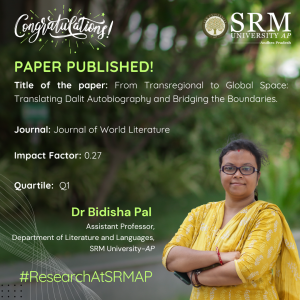 Translation often serves as a vital bridge between languages and cultures and Translators are often poised as “gatekeepers” who preserve the authenticity and richness of a text. Dr Bidisha Pal, Assistant Professor at the Department of Literature and Languages in her research paper, “From Transregional to Global Space: Translating Dalit Autobiography and Bridging the Boundaries” speaks of the power of translation in safeguarding and raising awareness of caste. Her work also illustrates how translation smoothens the divide between language and enables the voice of the marginalised to be heard.
Translation often serves as a vital bridge between languages and cultures and Translators are often poised as “gatekeepers” who preserve the authenticity and richness of a text. Dr Bidisha Pal, Assistant Professor at the Department of Literature and Languages in her research paper, “From Transregional to Global Space: Translating Dalit Autobiography and Bridging the Boundaries” speaks of the power of translation in safeguarding and raising awareness of caste. Her work also illustrates how translation smoothens the divide between language and enables the voice of the marginalised to be heard.
Abstract:
The present research brings forward some standpoints. First, the translation of Dalit autobiographies creates transnational solidarity. Second, the translators play the role of gatekeepers to show that translation sustains the literary and cultural essence ingrained within the texts and initiates and engages dialogic discussions among the audience and readers on the global platform. Third, the translation of Dalit autobiographies arrests the attention of those global readers who barely nurture any idea on caste, class, and casteist politics and deep-rooted issues like untouchability in India and constructs a distinct literary geography.
Explanation in layperson’s terms:
The research deals with the idea of literary translation and its necessity. These two autobiographies are written in regional Bengal. When translated, the boundary of regions gets dissolved, and the essence of the texts reach the global arena. Besides, translation also acts as the bridge to the outer world. However, oftentimes the act of translation is not an innocent act anymore; rather it interferes with the original meaning to transcreate.
Practical/ Social Implications:
The research talks about translation and its necessity to bridge boundaries. The texts that the article focuses on are from the people of the marginalized communities of Bengal who write to voice their concerns and who feature in a considerable period of history that should be known to people. Since, linguistic regionalism is the main constraint for the literary texts, translation provides the desired space and opportunity to help them reach the global platforms and their history and literature become part of the larger repertoire of World Literature.
The link to the article:
- Published in Departmental News, English Current Happenings, English news, News, Research News
Empowering Innovation at the 2nd Research Scholars’ Summit
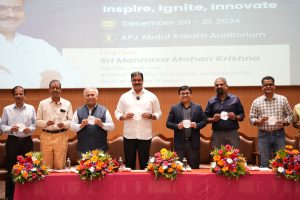 The varsity concluded the second edition of its distinguished Research Scholars’ Summit. This two-day summit witnessed the participation of 27 universities from the states of Andhra Pradesh and Telangana, resulting in a total of 243 abstract submissions.
The varsity concluded the second edition of its distinguished Research Scholars’ Summit. This two-day summit witnessed the participation of 27 universities from the states of Andhra Pradesh and Telangana, resulting in a total of 243 abstract submissions.
The summit delved into four major thematic areas namely: Engineering and Technology; Medicine, Life Sciences, Agriculture and Fisheries; Management, Social Sciences, Humanities, and Applied Sciences, including Computational Physics. Each thematic area encompassed a variety of subtopics.
The academic colloquium featured the esteemed presence of Shri Mannava Mohan Krishna, Honourable Chairman of Andhra Pradesh Technology Services, who graced the occasion as the chief guest. He expressed his vision for collaborative efforts with the researchers, stating, “We want to work with you, partner with you to serve the people better.” Shri Mohan Krishna also highlighted the Chief Minister, Shri N Chadraababu Naidu’s ambition to transform Andhra Pradesh into a technological hub, asserting that summits of this nature represent a commendable starting point. He also referred to the 153 services set to be launched under the WhatsApp Governance initiative by the government of Andhra Pradesh, stating that ideas such as these demonstrate how technological advancements benefit governance and thereby the society.
Prof. Manoj K. Arora, Vice Chancellor, SRM University-AP in his address, reminded the students that this summit serves as a platform for the exchange of ideas and offers a significant opportunity to the researchers for career progression. He emphasised SRM AP’s impressive research trajectory, stating, “in just seven and a half years since its inception, the university has established its presence on the scientific landscape.” While acknowledging the rise in research fervour, he urged attendees to prioritise the societal impact of their work stating that their PhD should symbolise Passion, Hard Work, and Dedication rather than a simple Doctor of Philosophy.
He encouraged students to meticulously frame their professional futures, he said “During your five years at the university, you should aspire to discern the path you wish to pursue—whether as educators, researchers, or entrepreneurs and the university will facilitate all the necessary resources to support your professional journey.” He also extended invitation to the scholars from other universities to come forward and use the infrastructure and facilities that SRMAP has invested in for Research.
The summit showcased a myriad of multidisciplinary research presentations from scholars culminating in the awarding of 18 gold medals, 14 silver medals and several special mention awards across various categories for their exemplary contribution. The success of the summit was further supported by the efforts of the convenors, Dr Sibendu Samanta, Dr Jatis Kumar Dash, and Mr Manikanta Bandlamudi, whose guidance and organisation were instrumental in creating a platform for scholarly exchange and collaboration.
Prof. Ranjit Thapa, Dean – Research, delivered the vote of thanks, expressing gratitude to all participants, organisers, and attendees. The summit culminated in a fruitful and awe-inspiring work showcasing dedication and perseverance and a promise to keep inspiring, igniting and innovating.
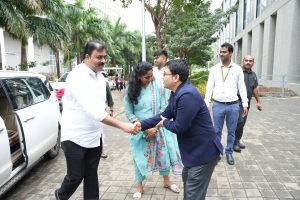
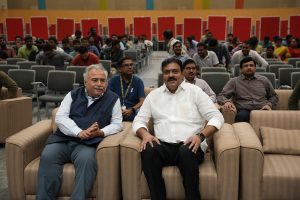
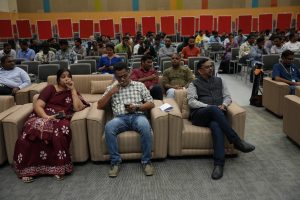
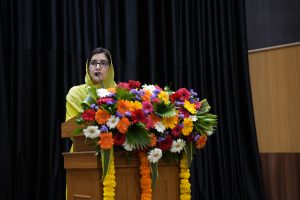
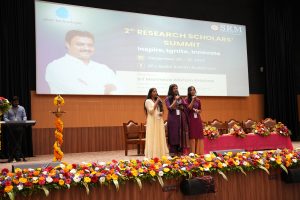
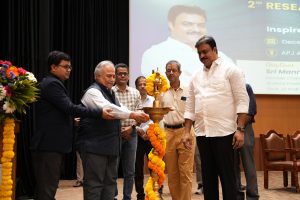
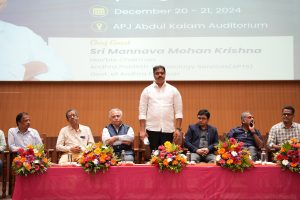
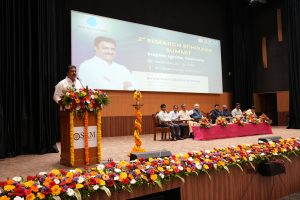
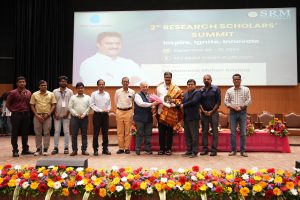

- Published in News, Research News
Two-day International Conference on Gender Exploitation Concludes
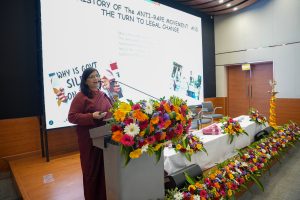 The two-day international conference on Breaking the Silence: Interdisciplinary Perspective on Gender Exploitation and Resistance organised under the auspices of SRM University-AP comes to a conclusion.
The two-day international conference on Breaking the Silence: Interdisciplinary Perspective on Gender Exploitation and Resistance organised under the auspices of SRM University-AP comes to a conclusion.
The international conference drew diverse audiences of academicians, academic experts, research scholars and students from across the country and outside, and featured talks by eminent academicians as Prof. Anita Singh, Department of English, Banaras Hindu University, Varanasi; Prof. Rajinder Dudrah, Professor of Cultural Studies and Creative Industries, Birmingham City University; Prof. Geetanjali Gangoli, Department of Sociology, Durham University; Prof. Nalini Iyer, Department of English, Seattle University; Prof. Priyanka Tripathi , Department of Humanities and Social Sciences, Indian Institute of Technology Patna.
The sessions explored themes of gender and resistance, intersectionality, trauma and survival and so on. With 5 guest speakers, over 70 research paper presentations and over 140 participants the conference offered multifaceted perspectives on Gender Exploitation and Resistance.
Prof. Vishnupad, Dean-Easwari School of Liberal Arts in his address stated, “Notwithstanding 60 odd years of feminist movements and scholarship, gender asymmetry and violence, is one of those archives that needs to be continually visited and revisited, because patriarchal forms and gender violence remains as rampant as it always was.” Further, while elaborating on violence, he questioned the easy equation of education with progress and conjectured on the relation of education and violence. The manic obsession in Indian society for engineering and medical degrees and its resulting impact on young school going students, for him, consisted of one such perverse instance; the annual student suicides number in places such as Kota amply instantiate that violence.
Dr Sayantan Thakur, Assistant Professor and Head – Department of Literature and Languages, remarked “Conferences such as these are both inspiring and daunting; while they convene bright minds capable of addressing critical issues, they also depict to us that challenges such as gender exploitation continue to be.”
Prof. Anita Singh from Banaras Hindu University in her keynote address cited several compelling instances wherein women were denied justice, reflecting thereby a troubled pattern of societal indifference.
The discourses in the conference addressed the multifaceted barriers that are posed within the system, compelling one to discuss, debate and deliberate and “break the silence” that surrounds gender exploitation.
- Published in Departmental News, English news, News
Faculty Training Programme: Enhancing Teaching Excellence
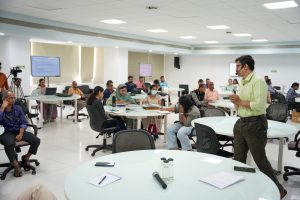 The Teaching Learning Centre(TLC) at SRM University-AP organised a two-day Faculty Training Programme on Teaching Methodologies & Pedagogies. The Faculty training Programme saw resource person Prof. Prasad Edamana from IIT, Madras delivering the session.Vice Chancellor Prof. Manoj K Arora; Associate Director, Dr S Mannathan; Assistant Professor and Co-ordinator, Dr Subeesh N P from the Teaching Learning Centre along with Faculties representing various Departments took part in the session.
The Teaching Learning Centre(TLC) at SRM University-AP organised a two-day Faculty Training Programme on Teaching Methodologies & Pedagogies. The Faculty training Programme saw resource person Prof. Prasad Edamana from IIT, Madras delivering the session.Vice Chancellor Prof. Manoj K Arora; Associate Director, Dr S Mannathan; Assistant Professor and Co-ordinator, Dr Subeesh N P from the Teaching Learning Centre along with Faculties representing various Departments took part in the session.
In his inaugural address Vice Chancellor Prof. Manoj K. Arora stressed on the essential connection between research and teaching within our academic framework. He stated – “Research and teaching cannot be two different verticals, the two should seamlessly intertwine to enhance educational experiences.”
He highlighted the need for the educators to be well-versed in their subject matter in order to improve effectiveness in teaching. He encouraged the teaching community at SRM AP to unite in this endeavour, taking a pledge to collaborate closely with him in order to build an institute of unmatched excellence
Prof. Arora detailed three crucial initiatives aimed at elevating the varsity as a paramount centre for knowledge that fosters the face of a brighter tomorrow : implementing a robust feedback mechanism, establishing a mentor-mentee programme, and promoting familiarity with academic programmes and regulations. He supported his points with case studies that illustrated the benefits of faculty engagement in these areas.
Prof. Prasad facilitated workshops on active learning techniques, including flipped classrooms, problem-based learning, and experiential teaching methods. Faculty members also participated in group activities, where they demonstrated their teaching methods and received detailed feedback from their peers and the resource person.
A significant highlight was the focus on aligning learning outcomes with innovative teaching practices. The participants explored strategies to make classrooms more engaging and inclusive, leveraging technology to enhance both teaching and student interaction.
The training programme concluded with a feedback session where participants shared their takeaways and suggestions for future workshops.
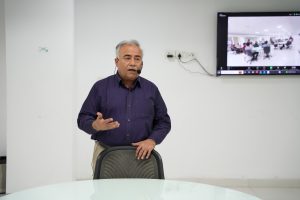
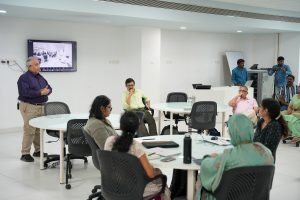
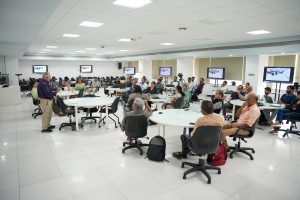
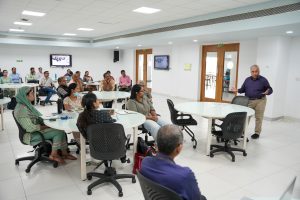
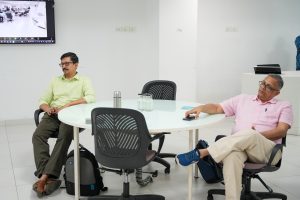
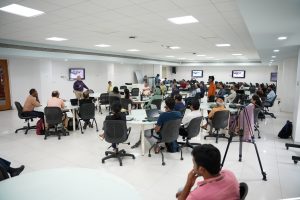
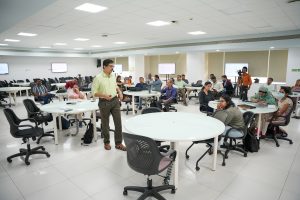
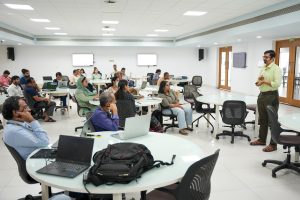
- Published in News, Teaching Learning Centre, TLC
A Blockchain and IoT-Driven Solution for Farmers
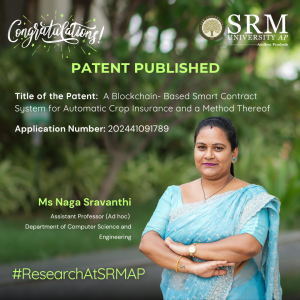 Farming is often regarded as an occupation that is challenging and has become a sobriquet for hardship and unpredictability, leaving farmers financially vulnerable and many a times at the brink of poverty. Insuring crops can, however, minimise the risk of loss, making it a viable option as long as the process doesn’t get bogged down by excessive bureaucracy and cumbersome paperwork. Dr Naga Sravanthi Puppala, Assistant Professor at the Department of Computer Science and Engineering has come up with a game-changing solution of utilising blockchain technology and real time IoT data for automatic and quick coverage of crops by simplifying the insurance process thereby helping reshaping the future of agriculture, just when it’s needed most.
Farming is often regarded as an occupation that is challenging and has become a sobriquet for hardship and unpredictability, leaving farmers financially vulnerable and many a times at the brink of poverty. Insuring crops can, however, minimise the risk of loss, making it a viable option as long as the process doesn’t get bogged down by excessive bureaucracy and cumbersome paperwork. Dr Naga Sravanthi Puppala, Assistant Professor at the Department of Computer Science and Engineering has come up with a game-changing solution of utilising blockchain technology and real time IoT data for automatic and quick coverage of crops by simplifying the insurance process thereby helping reshaping the future of agriculture, just when it’s needed most.
Abstract
The invention is a groundbreaking design patent that employs a single, sophisticated smart contract policy to autonomously manage the entire crop insurance process. This system innovatively combines blockchain technology with real-time IoT data collection to create an efficient, transparent, and reliable insurance solution for farmers. Central to this invention is a singular smart contract policy designed to oversee every stage of the insurance lifecycle, from policy issuance and dynamic risk assessment to claims processing and payout disbursement. This smart contract policy is meticulously programmed with specific conditions and thresholds, including weather patterns, soil moisture levels, and crop health indicators, all monitored by IoT devices in the field. As these conditions are tracked in real-time, the smart contract policy autonomously adjusts coverage and triggers payouts when necessary, eliminating the need for human intervention. This system not only enhances efficiency by reducing administrative costs but also ensures prompt and accurate payouts. By relying on tamper-proof data and predefined conditions, the invention offers a secure and transparent approach to crop insurance, providing farmers with a dependable safety net against crop losses.
In short, this invention makes crop insurance smarter, simpler, and fairer, giving farmers the support they need when they need it most.
Practical Implementation and Social Implications of the Research
Practical Implementation
- Blockchain: Secure platform for immutable records.
- Smart Contracts: Automate insurance claims based on predefined triggers.
- IoT Devices: Monitor crop and environmental data in real-time.
- Oracles: Fetch external data (e.g., weather reports).
- Workflow: Farmers enroll, pay premiums digitally, and receive automatic payouts if crop damage is detected.
Social Implications
- Transparency: Eliminates fraud and delays in claims.
- Inclusivity: Provides insurance access to small-scale farmers.
- Economic Stability: Reduces financial strain on farmers after disasters.
- Sustainability: Encourages data-driven, risk-resilient agriculture.
Future Research Plans:
Building upon the foundation of this invention, my future research will focus on advancing and expanding its applications to maximize impact in agriculture and beyond. Key areas of exploration include:
1. Enhancing IoT Integration for Precision Agriculture
Aimed to develop more advanced IoT devices and sensors that can collect highly specific data on soil quality, weather patterns, and crop health. This data will improve the system’s ability to predict risks and tailor insurance policies to individual farms. Research will also involve optimizing sensor networks for affordability and accessibility to smallholder farmers.
2. Developing Dynamic Risk Assessment Models
By incorporating machine learning and predictive analytics, I plan to create dynamic risk assessment models. These models will continuously learn from real-time data and historical trends, allowing the system to provide proactive alerts to farmers about potential risks and automatically adjust insurance terms to reflect current conditions.
3. Expanding Blockchain Applications Beyond Crop Insurance
While the current focus is on crop insurance, blockchain’s secure and transparent nature offers opportunities for broader agricultural applications. I intend to explore its use for supply chain traceability, ensuring that crops reach markets efficiently and without tampering, and for facilitating peer-to-peer lending among farmers.
4. Testing and Scaling in Diverse Agricultural Environments
Field trials will be conducted in various regions and farming contexts to test the system’s adaptability and scalability. This includes:
- Testing in regions prone to extreme weather conditions.
- Evaluating the system’s performance in specialized farming industries, such as vineyards or organic farming.
- Collaborating with agricultural cooperatives to implement the system across multiple farms simultaneously.
5. Social and Economic Impact Assessment
A critical part of my research will involve studying the socioeconomic impact of this invention on farmers, particularly smallholder farmers. I aim to assess how it influences their livelihoods, productivity, and financial security. This will guide future improvements to make the system more inclusive and equitable.
6. Exploring Policy and Regulatory Frameworks
For widespread adoption, I plan to engage with policymakers to align the system with existing agricultural and insurance regulations. The research will focus on creating policy frameworks that encourage adoption, particularly in developing regions and addressing potential legal challenges related to blockchain and data privacy.
7. Collaborating for Multi-Sectoral Impact
Partnerships with financial institutions, agritech companies, and government agencies to co-develop solutions that integrate blockchain-based insurance with other agricultural services, such as microloans, subsidies, and educational programs.
By addressing these areas, my research will contribute to creating a more resilient and sustainable agricultural ecosystem, empowering farmers with cutting-edge technology while enhancing food security and economic stability globally.
- Published in CSE NEWS, Departmental News, News, Research News


